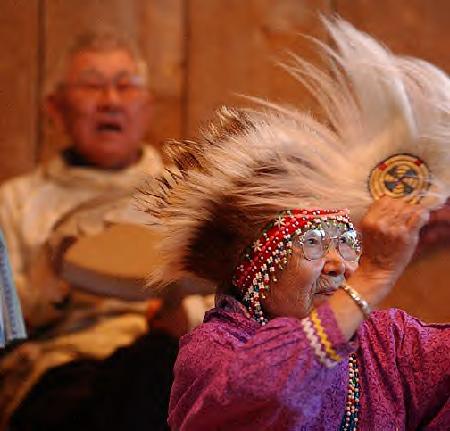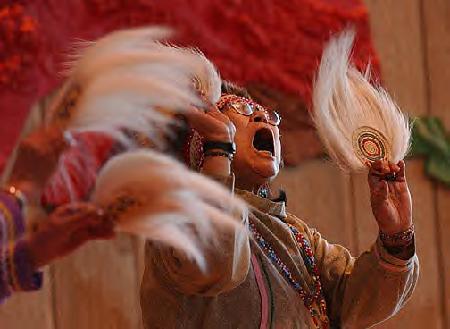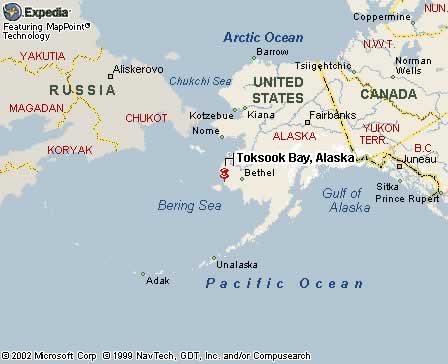|
|
Canku Ota |
|
|
(Many Paths) |
||
|
An Online Newsletter Celebrating Native America |
||
|
November 16, 2002 - Issue 74 |
||
|
|
||
|
Bladder Dance |
||
|
by Zaz Hollander Anchorage
Daily News
|
||
|
credits: Photos
by Bob Hallinen Anchorage Daily News
|
 An
ancient tradition that all but vanished from the seal-hunting villages
of Western Alaska for more than 50 years returned to life Saturday in
Anchorage. An
ancient tradition that all but vanished from the seal-hunting villages
of Western Alaska for more than 50 years returned to life Saturday in
Anchorage. Dancers from Toksook Bay reincarnated a few brief excerpts from the Yup'ik bladder festival on the stage of the Alaska Native Heritage Center. Seal-hunting Yup'ik villages once performed the festival every hunting season to honor the animal that provided them with meat, oil and spiritual strength. The souls of the animals inhabit the bladders, the hunters believed. By revering the bladders, villages showed their respect for the seals and hoped for good hunting ahead. Yup'ik hunters still hunt seals but villages haven't performed the festival for at least 50 years or more, said Theresa John, a member of the Toksook Bay Dance Group who lives in Bethel, where she teaches at the College of Rural Alaska. John's father, Paul John, led the group Saturday, explaining to the audience in Yup'ik that the complicated festival used to span at least a week. Saturday's performers had a little more than an hour. "Due to time constraints, you will only get a glimpse of what the bladder festival was really like," John said through his daughter. Dancers took the stage, all from Toksook Bay, though some live in Anchorage or other communities. They wore traditional kuspuks. The women spelled out the stories with caribou fur dance fans; two middle school boys used men's five-feather fans.
But in younger days, he and a friend were sitting inside a house singing when a white-grass basket full of dried bladders started to vibrate. The men sang faster and faster, Theresa John translated. "Each time, the bladders danced." There were no dried seal bladders dancing on the stage as a largely non-Native crowd watched the dancing and singing. But the spirit moved dancers and watchers, to hear both tell it. "I can't understand his language, but I'm listening to the emotion behind it," said Andrew Weare, 53, born in Wales and now living in Anchorage. "You could see it was straight from his soul. That shook me in my shoes." Theresa John came off the stage hot from dancing in her regalia but glowing. "Today we revived many old stories," she said. "It's a good beginning. It's a spiritual revival."
|
|
|
||
|
|
||
| Canku Ota is a free Newsletter celebrating Native America, its traditions and accomplishments . We do not provide subscriber or visitor names to anyone. Some articles presented in Canku Ota may contain copyright material. We have received appropriate permissions for republishing any articles. Material appearing here is distributed without profit or monetary gain to those who have expressed an interest. This is in accordance with Title 17 U.S.C. section 107. | ||
|
Canku Ota is a copyright © 2000, 2001, 2002 of Vicki Lockard and Paul Barry. |
||
 |
 |
|
|
The "Canku Ota - A Newsletter Celebrating Native America" web site and its design is the |
||
|
Copyright © 1999, 2000, 2001, 2002 of Paul C. Barry. |
||
|
All Rights Reserved. |
||
 They
performed several songs, including one that told the story of Paul John's
uncle, the oldest man in Toksook Bay, a mostly Yup'ik village of about
500 people on Nelson Island 115 miles northwest of Bethel. Today the
90-something elder motors to village steam baths on a four-wheeler despite
one fake eye and another that doesn't work so well.
They
performed several songs, including one that told the story of Paul John's
uncle, the oldest man in Toksook Bay, a mostly Yup'ik village of about
500 people on Nelson Island 115 miles northwest of Bethel. Today the
90-something elder motors to village steam baths on a four-wheeler despite
one fake eye and another that doesn't work so well.